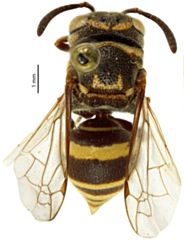Project 4659: L. Chavarría‐Pizarro, M. da Silva, D. C. Ament, E. A. Almeida, F. B. Noll. 2023. Behavioural evolution of Neotropical social wasps (Vespidae: Polistinae): the queen selection process. Cladistics. early view:early view.
Abstract
All Epiponini wasps are polygynic, with multiple queens alternating over the colony cycle. There are several potential queens in the early stages of this cycle, but as it progresses, the number of queens is reduced. Because most individuals remain reproductively totipotent, there is great potential for conflicts over reproduction. Workers could have an advantage in controlling queen production because they are much more numerous than queens. Nevertheless, the queen selection process is little known for Epiponini. For this reason, we aimed to study the behaviour of queens and workers during queen selection in multiple species of Epiponini, integrate information from previous behavioural studies, and perform a comparative analysis to interpret changes evolutionarily. We conducted observations on nine species belonging to five genera: Brachygastra, Chartergellus, Metapolybia, Polybia and Protopolybia. Females were individually marked to make direct and video observations. Queen production was artificially induced. A total of 28 behaviours related to queen selection were identified. The most aggressive interactions between castes, such as bite and dart, were lost in the major lineages of Epiponini. Bending display I is an ancient behaviour used as the main dominance display. Behaviours exhibited by workers to test queen status arose in the common ancestor of the Epiponini and are not shared by other polistine wasps. Consequently, the act of workers testing queen status probably was present in the Epiponini ancestor. Ritualized test display and dominance behaviours are used in Epiponini as honest signals of the queen's reproductive potential instead of aggressive behaviours. Caste flexibility had already been suggested as the ground plan for Epiponini and is herein discussed as decisive for colony survival of swarm wasps, because it allows colonies to respond efficiently to different situations that may eventually arise.Read the article »
Article DOI: 10.1111/cla.12529
Project DOI: 10.7934/P4659, http://dx.doi.org/10.7934/P4659
| This project contains |
|---|
Download Project SDD File |
Currently Viewing:
MorphoBank Project 4659
MorphoBank Project 4659
- Creation Date:
28 April 2023 - Publication Date:
02 May 2023
Authors' Institutions ![]()
- Universidade de Sao Paulo (USP, University of Sao Paulo)
- Universidade Estadual Paulista Júlio de Mesquita Filho (UNESP, São Paulo State University)
Members
| member name | taxa |
specimens |
media |
| MorphoBank Curator Project Administrator | 3 | 1 | 1 |
| Laura Chavarría-Pizarro Full membership | 0 | 0 | 0 |
Project has no matrices defined.
Project downloads 
| type | number of downloads | Individual items downloaded (where applicable) |
| Total downloads from project | 3 | |
| Document downloads | 3 | Matrix in TNT format (2 downloads); Characters and states (1 download); |

